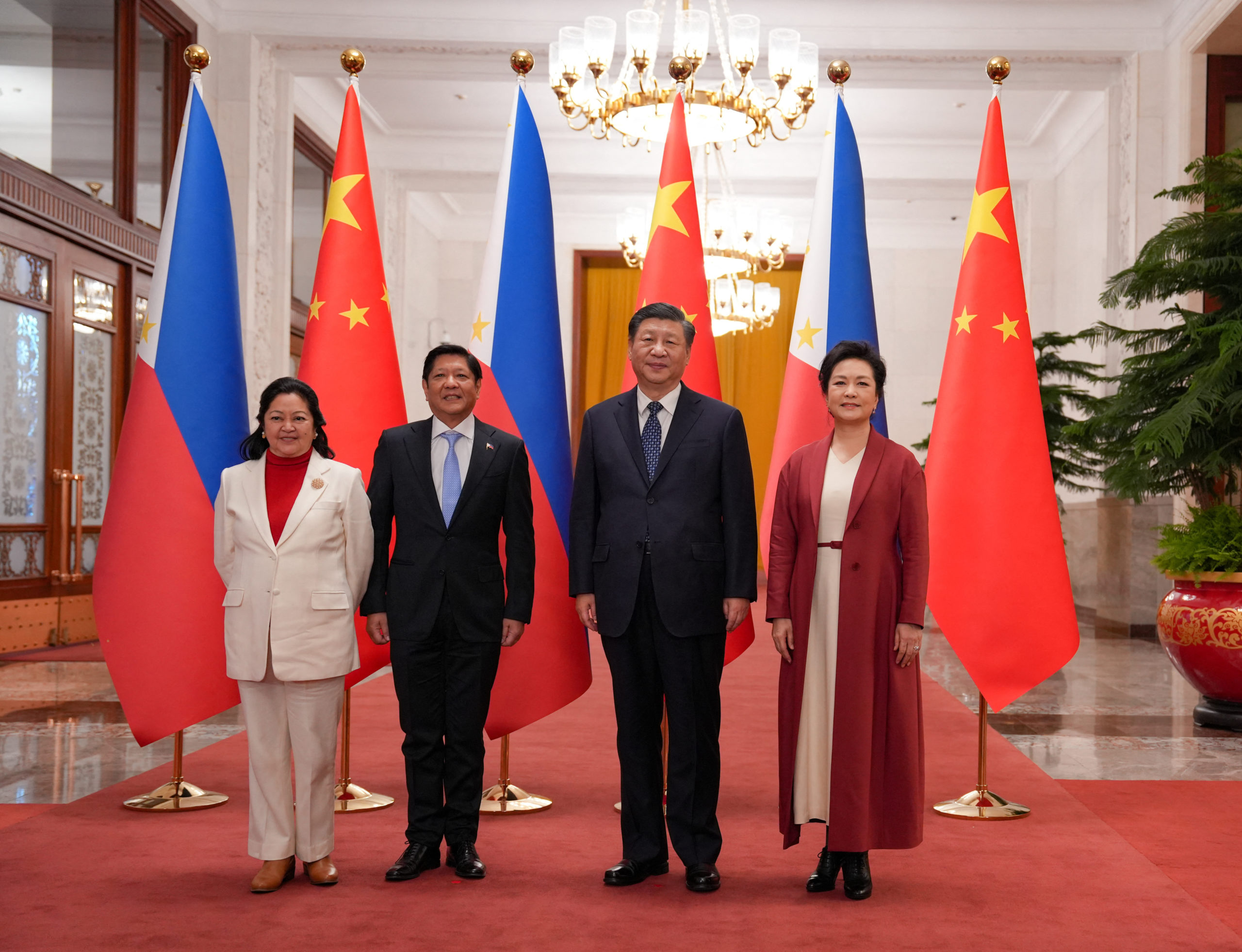
Philippines’ President Ferdinand “Bongbong” Marcos Jr. and First Lady Liza Araneta Marcos are photographed with China President Xi Jinping and his wife Peng Li Yuan during a welcoming ceremony at the Great Hall of the People in Beijing, China, January 4, 2023. Office of the Press Secretary/Handout via REUTERS
MANILA, Philippines –Chinese President Xi Jinping has pledged to work with Philippine President Ferdinand Marcos Jr. to improve relations and create a plan to expand cooperation “in the new era.”
During their bilateral meeting in Beijing on Wednesday, Xi said Marcos’ three-day state visit was “to honor history, but more importantly, is to open up the future.”
Xi said he hopes to strengthen bilateral relations.
“Together, let’s deepen cooperation and draw out a blueprint with China-Philippines cooperation in the new era. This way, we will bring more benefits to our people and contribute to peace and stability in the region,” he said, as quoted in a statement from the Presidential Communications Office (PCO).
Marcos, according to the PCO, also told Xi that he hopes not only to revive the relationship between the Philippines and China that existed before the pandemic but also “build [it] up to greater heights.”
“And that this is one of my main goals that I hope to achieve as we are here in China and meeting with you, Your Excellency. We hope to achieve to further that relationship we have,” he added.
Bringing up maritime row
Among the things Marcos said he hopes the two countries would continue doing is negotiating for the joint exploration of the South China Sea.
“I really hope—I would very much like, as you have suggested, Mr. President, to be able to announce that we are continuing negotiations and that we hope that these negotiations will bear fruit because the pressure upon not only China, not only the Philippines but the rest of the world to move away from the traditional fronts of power,” he added.
READ: Xi to Marcos: China ready to resume oil, gas talks
Marcos told China’s top legislator Li Zhanshu that their maritime conflict should not define their relationship.
“Our relationship extends to commerce, culture, education, investment, trade and in every level,” he said.
China claims nearly all of the South China Sea, including parts of the West Philippine Sea, its potential offshore oil and gas deposits, and traditional fishing grounds, causing a long-standing dispute with the Philippines.
In 2016, an international arbitral tribunal upheld the Philippines’ claim to the contested waters.
Xi also heard about the suffering of Filipino fishermen in the West Philippine Sea from Marcos.
“The President promised that we would find a compromise and find a solution that will be beneficial, so that our fishermen might be able to fish again in their natural fishing grounds,” he said.
READ: Marcos: China vows solution to plight of Filipino fishermen in West Philippine Sea
Pamalakaya, a Philippine federation of small fisherfolk organizations, declared that the West Philippine Sea is a non-negotiable matter.
“There can only be one solution: China must abide by the International Tribunal of the Law of the Sea that recognizes our exclusive economic zone. China should leave the Philippine waters immediately and unconditionally. No compromise,” it said in a statement.
Marcos said a broad scope of subjects was discussed in his bilateral meeting with Xi.
In a separate statement, the PCO said Marcos “received a commitment” from Xi to address the trade imbalance between the Philippines and China.
“I’m very glad that we are in the process of finalizing the rules and regulations for the import by China of fruits from the Philippines,” Marcos noted.
“And I believe that very soon now, we will be able to see the different fruits…the high-quality agricultural products coming from the Philippines start to come into China to balance the trade situation that we have between China and the Philippines.”
The President had also announced that the agreement on a protocol of phytosanitary requirements for exporting fresh from the Philippines to China has been signed, signifying that the market for the pungent fruit is “now open to Philippine exporters and Chinese importers.”
READ: Marcos: PH durian market in China ‘now open’
The PCO added that the Philippines also signed 14 bilateral agreements ranging from agriculture, infrastructure, development cooperation, maritime security, and tourism throughout Marcos’ three-day state visit.

